Analysis of Director's Duties: ASIC v. Rich [2009] NSWSC 1229
VerifiedAdded on 2023/06/12
|5
|1187
|371
Case Study
AI Summary
This case study provides an analysis of ASIC v. Rich [2009] NSWSC 1229, a significant case in Australian company law concerning the duties of directors, particularly their duty of care under Section 180 of the Corporations Act 2001. The case revolves around the collapse of One.Tel and allegations that its directors, including Jodee Rich, failed to adequately inform the board about the company's true financial state. The analysis explores the application of the business judgment rule, which can absolve directors of liability if their decisions were made in good faith, without self-interest, with reasonable diligence, and in the belief that the decisions were in the company's best interest. The judgment ultimately found in favor of the directors, highlighting the importance of the business judgment defense in cases involving alleged breaches of directors' duties, concluding that the directors acted reasonably in withholding information to avoid causing panic that could have prematurely ended the company's operations, particularly given the expectation of continued financial support.
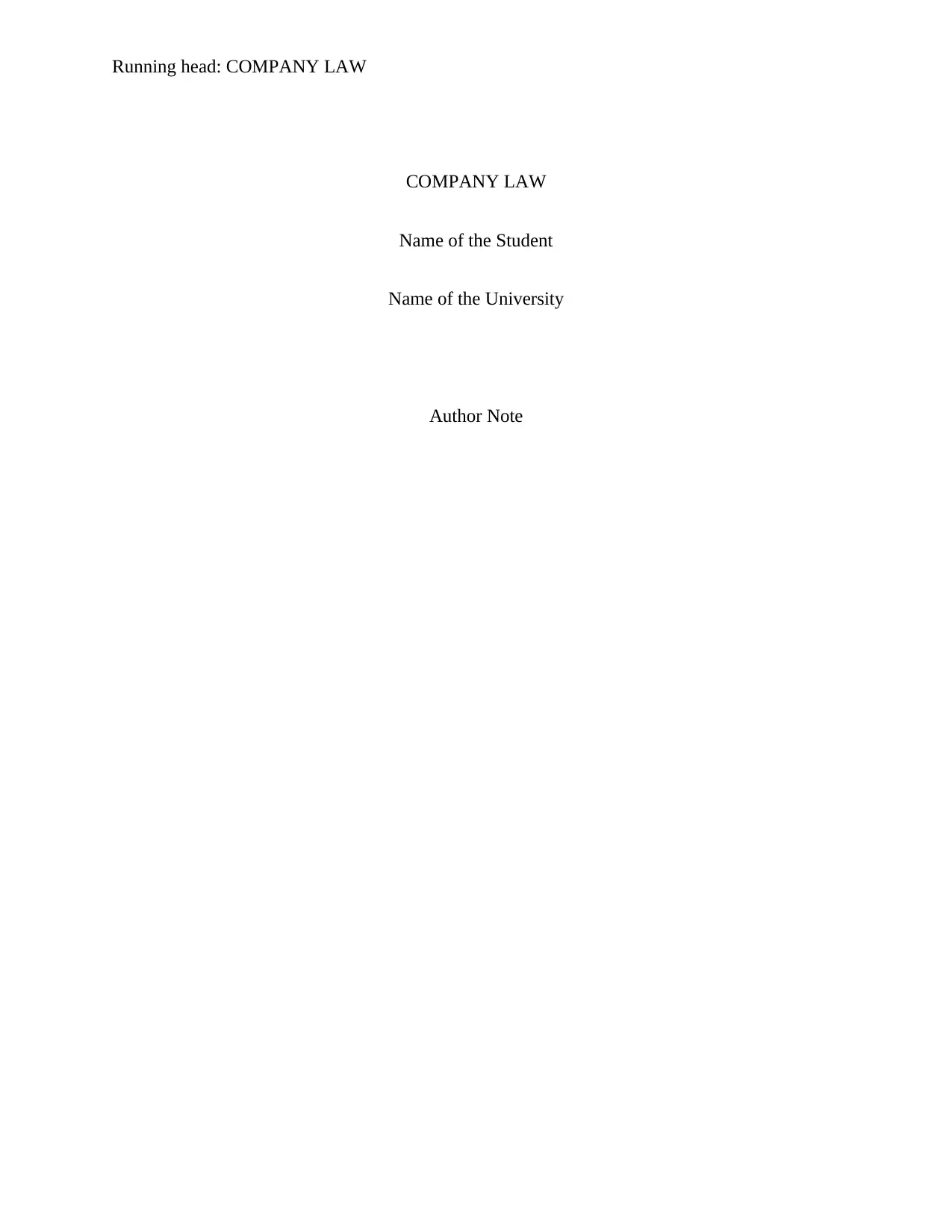
Running head: COMPANY LAW
COMPANY LAW
Name of the Student
Name of the University
Author Note
COMPANY LAW
Name of the Student
Name of the University
Author Note
Paraphrase This Document
Need a fresh take? Get an instant paraphrase of this document with our AI Paraphraser
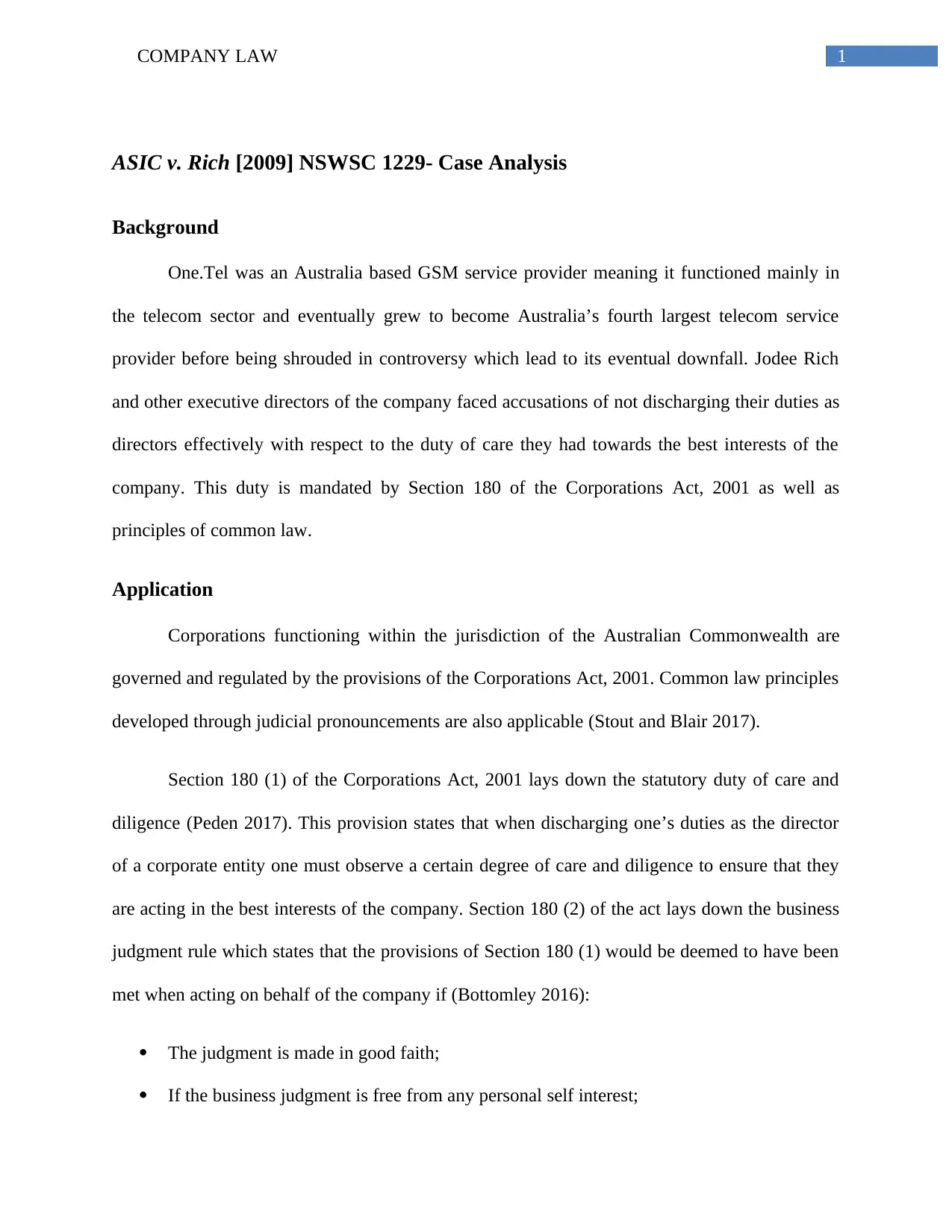
1COMPANY LAW
ASIC v. Rich [2009] NSWSC 1229- Case Analysis
Background
One.Tel was an Australia based GSM service provider meaning it functioned mainly in
the telecom sector and eventually grew to become Australia’s fourth largest telecom service
provider before being shrouded in controversy which lead to its eventual downfall. Jodee Rich
and other executive directors of the company faced accusations of not discharging their duties as
directors effectively with respect to the duty of care they had towards the best interests of the
company. This duty is mandated by Section 180 of the Corporations Act, 2001 as well as
principles of common law.
Application
Corporations functioning within the jurisdiction of the Australian Commonwealth are
governed and regulated by the provisions of the Corporations Act, 2001. Common law principles
developed through judicial pronouncements are also applicable (Stout and Blair 2017).
Section 180 (1) of the Corporations Act, 2001 lays down the statutory duty of care and
diligence (Peden 2017). This provision states that when discharging one’s duties as the director
of a corporate entity one must observe a certain degree of care and diligence to ensure that they
are acting in the best interests of the company. Section 180 (2) of the act lays down the business
judgment rule which states that the provisions of Section 180 (1) would be deemed to have been
met when acting on behalf of the company if (Bottomley 2016):
The judgment is made in good faith;
If the business judgment is free from any personal self interest;
ASIC v. Rich [2009] NSWSC 1229- Case Analysis
Background
One.Tel was an Australia based GSM service provider meaning it functioned mainly in
the telecom sector and eventually grew to become Australia’s fourth largest telecom service
provider before being shrouded in controversy which lead to its eventual downfall. Jodee Rich
and other executive directors of the company faced accusations of not discharging their duties as
directors effectively with respect to the duty of care they had towards the best interests of the
company. This duty is mandated by Section 180 of the Corporations Act, 2001 as well as
principles of common law.
Application
Corporations functioning within the jurisdiction of the Australian Commonwealth are
governed and regulated by the provisions of the Corporations Act, 2001. Common law principles
developed through judicial pronouncements are also applicable (Stout and Blair 2017).
Section 180 (1) of the Corporations Act, 2001 lays down the statutory duty of care and
diligence (Peden 2017). This provision states that when discharging one’s duties as the director
of a corporate entity one must observe a certain degree of care and diligence to ensure that they
are acting in the best interests of the company. Section 180 (2) of the act lays down the business
judgment rule which states that the provisions of Section 180 (1) would be deemed to have been
met when acting on behalf of the company if (Bottomley 2016):
The judgment is made in good faith;
If the business judgment is free from any personal self interest;
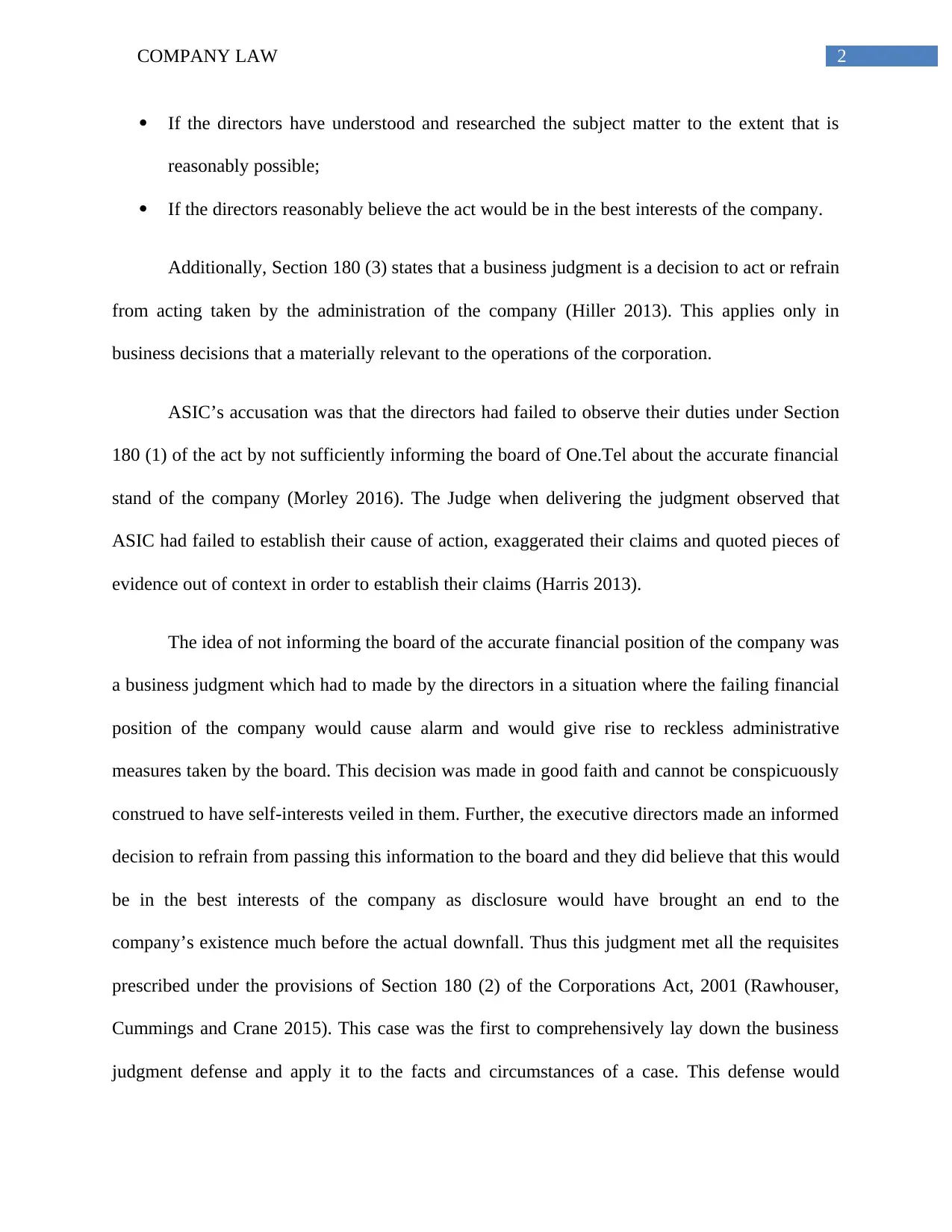
2COMPANY LAW
If the directors have understood and researched the subject matter to the extent that is
reasonably possible;
If the directors reasonably believe the act would be in the best interests of the company.
Additionally, Section 180 (3) states that a business judgment is a decision to act or refrain
from acting taken by the administration of the company (Hiller 2013). This applies only in
business decisions that a materially relevant to the operations of the corporation.
ASIC’s accusation was that the directors had failed to observe their duties under Section
180 (1) of the act by not sufficiently informing the board of One.Tel about the accurate financial
stand of the company (Morley 2016). The Judge when delivering the judgment observed that
ASIC had failed to establish their cause of action, exaggerated their claims and quoted pieces of
evidence out of context in order to establish their claims (Harris 2013).
The idea of not informing the board of the accurate financial position of the company was
a business judgment which had to made by the directors in a situation where the failing financial
position of the company would cause alarm and would give rise to reckless administrative
measures taken by the board. This decision was made in good faith and cannot be conspicuously
construed to have self-interests veiled in them. Further, the executive directors made an informed
decision to refrain from passing this information to the board and they did believe that this would
be in the best interests of the company as disclosure would have brought an end to the
company’s existence much before the actual downfall. Thus this judgment met all the requisites
prescribed under the provisions of Section 180 (2) of the Corporations Act, 2001 (Rawhouser,
Cummings and Crane 2015). This case was the first to comprehensively lay down the business
judgment defense and apply it to the facts and circumstances of a case. This defense would
If the directors have understood and researched the subject matter to the extent that is
reasonably possible;
If the directors reasonably believe the act would be in the best interests of the company.
Additionally, Section 180 (3) states that a business judgment is a decision to act or refrain
from acting taken by the administration of the company (Hiller 2013). This applies only in
business decisions that a materially relevant to the operations of the corporation.
ASIC’s accusation was that the directors had failed to observe their duties under Section
180 (1) of the act by not sufficiently informing the board of One.Tel about the accurate financial
stand of the company (Morley 2016). The Judge when delivering the judgment observed that
ASIC had failed to establish their cause of action, exaggerated their claims and quoted pieces of
evidence out of context in order to establish their claims (Harris 2013).
The idea of not informing the board of the accurate financial position of the company was
a business judgment which had to made by the directors in a situation where the failing financial
position of the company would cause alarm and would give rise to reckless administrative
measures taken by the board. This decision was made in good faith and cannot be conspicuously
construed to have self-interests veiled in them. Further, the executive directors made an informed
decision to refrain from passing this information to the board and they did believe that this would
be in the best interests of the company as disclosure would have brought an end to the
company’s existence much before the actual downfall. Thus this judgment met all the requisites
prescribed under the provisions of Section 180 (2) of the Corporations Act, 2001 (Rawhouser,
Cummings and Crane 2015). This case was the first to comprehensively lay down the business
judgment defense and apply it to the facts and circumstances of a case. This defense would
⊘ This is a preview!⊘
Do you want full access?
Subscribe today to unlock all pages.

Trusted by 1+ million students worldwide
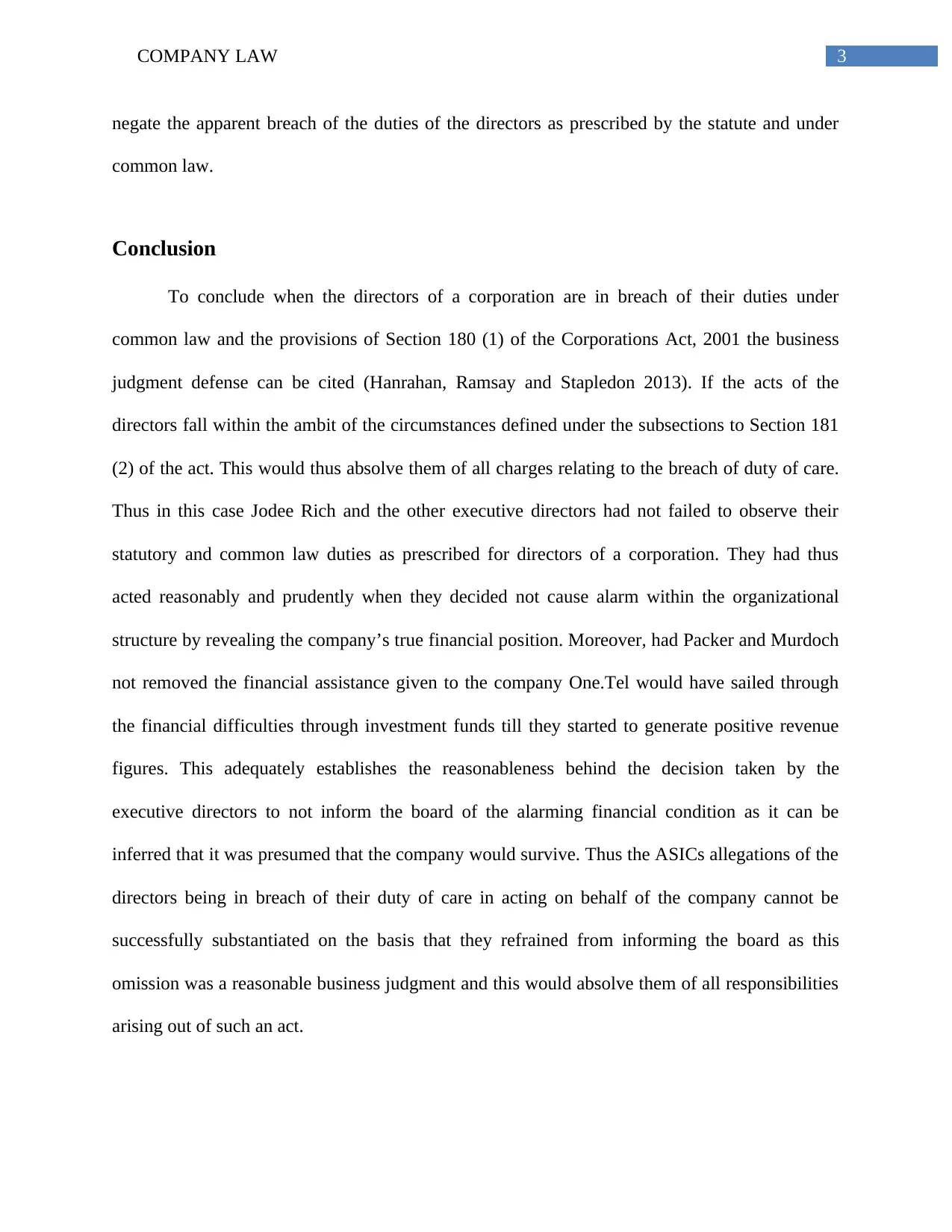
3COMPANY LAW
negate the apparent breach of the duties of the directors as prescribed by the statute and under
common law.
Conclusion
To conclude when the directors of a corporation are in breach of their duties under
common law and the provisions of Section 180 (1) of the Corporations Act, 2001 the business
judgment defense can be cited (Hanrahan, Ramsay and Stapledon 2013). If the acts of the
directors fall within the ambit of the circumstances defined under the subsections to Section 181
(2) of the act. This would thus absolve them of all charges relating to the breach of duty of care.
Thus in this case Jodee Rich and the other executive directors had not failed to observe their
statutory and common law duties as prescribed for directors of a corporation. They had thus
acted reasonably and prudently when they decided not cause alarm within the organizational
structure by revealing the company’s true financial position. Moreover, had Packer and Murdoch
not removed the financial assistance given to the company One.Tel would have sailed through
the financial difficulties through investment funds till they started to generate positive revenue
figures. This adequately establishes the reasonableness behind the decision taken by the
executive directors to not inform the board of the alarming financial condition as it can be
inferred that it was presumed that the company would survive. Thus the ASICs allegations of the
directors being in breach of their duty of care in acting on behalf of the company cannot be
successfully substantiated on the basis that they refrained from informing the board as this
omission was a reasonable business judgment and this would absolve them of all responsibilities
arising out of such an act.
negate the apparent breach of the duties of the directors as prescribed by the statute and under
common law.
Conclusion
To conclude when the directors of a corporation are in breach of their duties under
common law and the provisions of Section 180 (1) of the Corporations Act, 2001 the business
judgment defense can be cited (Hanrahan, Ramsay and Stapledon 2013). If the acts of the
directors fall within the ambit of the circumstances defined under the subsections to Section 181
(2) of the act. This would thus absolve them of all charges relating to the breach of duty of care.
Thus in this case Jodee Rich and the other executive directors had not failed to observe their
statutory and common law duties as prescribed for directors of a corporation. They had thus
acted reasonably and prudently when they decided not cause alarm within the organizational
structure by revealing the company’s true financial position. Moreover, had Packer and Murdoch
not removed the financial assistance given to the company One.Tel would have sailed through
the financial difficulties through investment funds till they started to generate positive revenue
figures. This adequately establishes the reasonableness behind the decision taken by the
executive directors to not inform the board of the alarming financial condition as it can be
inferred that it was presumed that the company would survive. Thus the ASICs allegations of the
directors being in breach of their duty of care in acting on behalf of the company cannot be
successfully substantiated on the basis that they refrained from informing the board as this
omission was a reasonable business judgment and this would absolve them of all responsibilities
arising out of such an act.
Paraphrase This Document
Need a fresh take? Get an instant paraphrase of this document with our AI Paraphraser
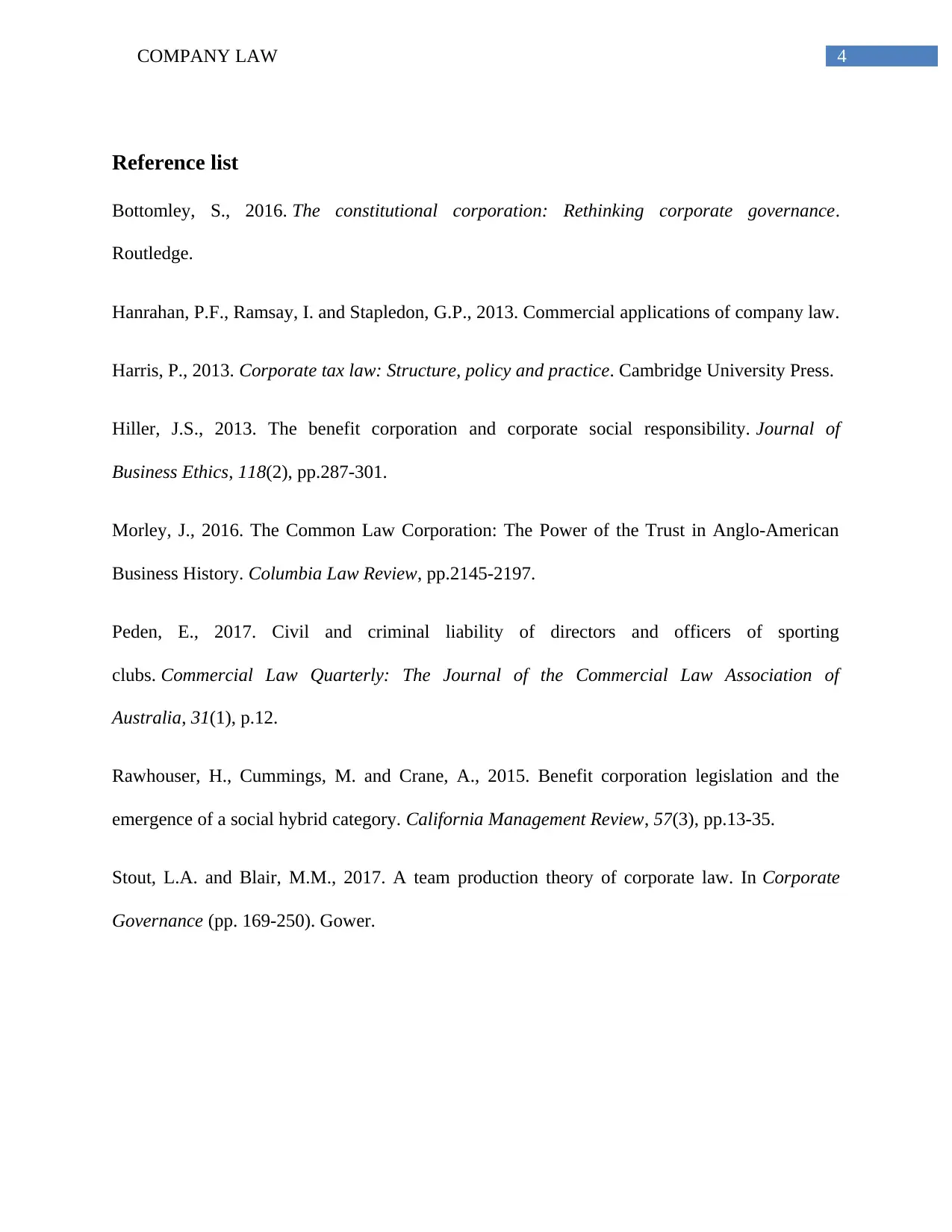
4COMPANY LAW
Reference list
Bottomley, S., 2016. The constitutional corporation: Rethinking corporate governance.
Routledge.
Hanrahan, P.F., Ramsay, I. and Stapledon, G.P., 2013. Commercial applications of company law.
Harris, P., 2013. Corporate tax law: Structure, policy and practice. Cambridge University Press.
Hiller, J.S., 2013. The benefit corporation and corporate social responsibility. Journal of
Business Ethics, 118(2), pp.287-301.
Morley, J., 2016. The Common Law Corporation: The Power of the Trust in Anglo-American
Business History. Columbia Law Review, pp.2145-2197.
Peden, E., 2017. Civil and criminal liability of directors and officers of sporting
clubs. Commercial Law Quarterly: The Journal of the Commercial Law Association of
Australia, 31(1), p.12.
Rawhouser, H., Cummings, M. and Crane, A., 2015. Benefit corporation legislation and the
emergence of a social hybrid category. California Management Review, 57(3), pp.13-35.
Stout, L.A. and Blair, M.M., 2017. A team production theory of corporate law. In Corporate
Governance (pp. 169-250). Gower.
Reference list
Bottomley, S., 2016. The constitutional corporation: Rethinking corporate governance.
Routledge.
Hanrahan, P.F., Ramsay, I. and Stapledon, G.P., 2013. Commercial applications of company law.
Harris, P., 2013. Corporate tax law: Structure, policy and practice. Cambridge University Press.
Hiller, J.S., 2013. The benefit corporation and corporate social responsibility. Journal of
Business Ethics, 118(2), pp.287-301.
Morley, J., 2016. The Common Law Corporation: The Power of the Trust in Anglo-American
Business History. Columbia Law Review, pp.2145-2197.
Peden, E., 2017. Civil and criminal liability of directors and officers of sporting
clubs. Commercial Law Quarterly: The Journal of the Commercial Law Association of
Australia, 31(1), p.12.
Rawhouser, H., Cummings, M. and Crane, A., 2015. Benefit corporation legislation and the
emergence of a social hybrid category. California Management Review, 57(3), pp.13-35.
Stout, L.A. and Blair, M.M., 2017. A team production theory of corporate law. In Corporate
Governance (pp. 169-250). Gower.
1 out of 5
Related Documents
Your All-in-One AI-Powered Toolkit for Academic Success.
+13062052269
info@desklib.com
Available 24*7 on WhatsApp / Email
![[object Object]](/_next/static/media/star-bottom.7253800d.svg)
Unlock your academic potential
Copyright © 2020–2026 A2Z Services. All Rights Reserved. Developed and managed by ZUCOL.
![Analysis of ASIC V. RICH [2003] Case on Corporations Act Section 180](/_next/image/?url=https%3A%2F%2Fdesklib.com%2Fmedia%2Fasic-rich-analysis-corporations-act_page_2.jpg&w=256&q=75)




